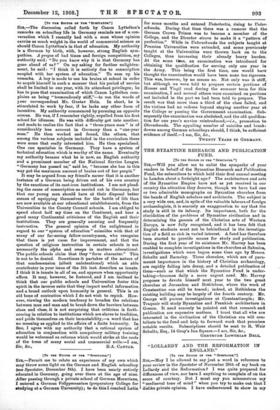[TO TIM EDITOR OP TIER "EPROrATOR."]
Silk—The discussion called forth by Canon Lyttelton's remarks on schoolboy life in Germany reminds me of a con- versation which I recently had with a man whose opinion carries as much weight in the world of commercial science as should Canon Lyttelton's in that of education. My authority is a German by birth, with, however, strong English sym- pathies. A propos of bad times and foreign competition, my authority said: "Do you know why it is that Germany has gone ahead of us ? " On my asking for further enlighten- ment, he said : "I think it is entirely due to conscription coupled with her system of education." To sum up his remarks. A boy is made to use his brains at school in order to acquit himself in such a manner that his period of service shall be limited to one year, with its attendant privileges; he has to pass that examination of which Canon Lyttelton com- plains as being "tremendously stiff,"—to use the words of your correspondent Mr. Gustav Heim In short, he is stimulated to work by fear, if he lacks any other form of incentive. My authority commenced by pursuing an opposite course. He was, if I remember rightly, expelled from his first school for idleness. He was with difficulty got into another. and made to realise the fact that a " three-years man" is of considerably less account in Germany than a "one-year man." He then worked and found, like others, that among the various subjects included in the curriculum there were some that really interested him. He then specialised. One can specialise in Germany. They have a system of technical education which is worthy of the name. Eventually my authority became what he is now, an English authority and a prominent member of the National Service League. " Germany has passed us," said he, " because she has in this way got the maximum amount of brains out of her people."
It may be argued from my friend's career that it is another instance of a German being driven out of his own country by the exactions of its cast-iron institutions. I am not plead- ing the cause of conscription as carried out in Germany, but that our young men should have at their disposal better means of equipping themselves for the battle of life than are now available at our educational establishments, from the Universities to the County Council schools. I am obliged to spend about half my time on the Continent, and hear a good many Continental criticisms of the English and their institutions. They are generally amusing and frequently instructive. The general opinion of the enlightened in regard to our " system of education" coincides with that of many of our far-seeing fellow-countrymen, who recognise that there is yet room for improvement, and that the question of religious instruction in certain schools is not necessarily the alpha and omega in matters educational. The public schools claim that they "form character." This is not to be denied. Sometimes it partakes of the nature of that condescension (albeit unintentional) which an able contributor in your issue of the 5th inst. describes as innate. I think it is innate in all of us, and appears when opportunity offers. It may, however, be fostered, and I am inclined to think that our public schools and Universities foster this spirit in the inverse ratio that they impart useful information and a broad outlook upon humanity in general. This is an old bone of contention which I do not wish to repick. How- ever, viewing the modern tendency to broaden the relations between man and man and to break down the barriers between class and class, it is not surprising that criticism is forth- coming in relation to institutions which are slaves to tradition, and pride themselves on their immutability,—a word that has no meaning as applied to the affairs of a finite humanity. In fine, I agree with my authority that a rational system of education in conjunction with compulsory military training would be welcomed as reforms which would strike at the roots of the trees of many social and commercial evils.—I am,






























































 Previous page
Previous page